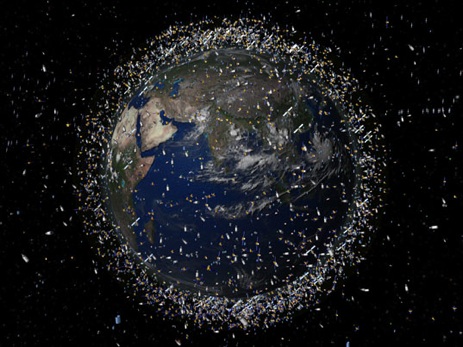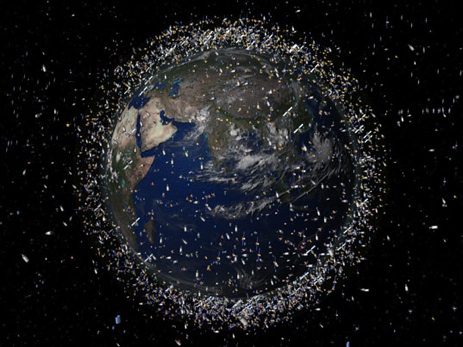 Image: European Space AgencyIt’s not just the Earth we’re junking up. There’s also a ton of man-made space-crud in orbit around the planet. Efforts to keep track of it are falling short — there are an estimated 600,000 pieces of stuff bigger than a centimeter in diameter, and fewer than 20,000 can be tracked — but plans to start cleaning it up have already been set in motion.
Image: European Space AgencyIt’s not just the Earth we’re junking up. There’s also a ton of man-made space-crud in orbit around the planet. Efforts to keep track of it are falling short — there are an estimated 600,000 pieces of stuff bigger than a centimeter in diameter, and fewer than 20,000 can be tracked — but plans to start cleaning it up have already been set in motion.
The horizon is not a circular file: One thing our space program has discovered about the universe is that you can’t just keep throwing shit into it without consequences. Scientists used to think that space could absorb a pretty unlimited amount of trash. Turns out that trash hangs around, and even makes more trash by smashing into itself and scattering debris.
As above, so below: We’re talking about decades worth of debris from various space missions, but China isn’t helping by exploding satellites with missiles, as they did in 2007. You say China forged ahead with a plan regardless of how much pollution it would produce? Surely not.
In addition to introducing a renewed military dimension to space, the destruction of the Chinese satellite created a large “debris cloud” that can seriously damage other satellites in nearby orbit, and possibly even spacecraft on their way to the moon or beyond. Analysts said that based on computer models, as many as 300,000 pieces of debris may have been created. While many would be very small, they said, hundreds would be large enough to create potentially serious problems.
Net gains: One Japanese company has an innovative way to clean up space pollution — they’re basically trawling for trash with a specialized space net.
A JAXA satellite will deploy and release a kilometers-wide net made by Nitto Seimo of ultra-thin triple layered metal threads. The net will gradually be drawn into Earth’s magnetic field and burned up along with the abandoned satellites, engine parts and other litter it’s collected.
The U.S. also has a net-based cleanup proposal, as well as a “laser broom,” and British scientists have an idea for a sail-enabled satellite that could do some tidying starting in 2013. Other ideas worth considering: Robot maids with vacuums; giant ball of garbage; Superman.



